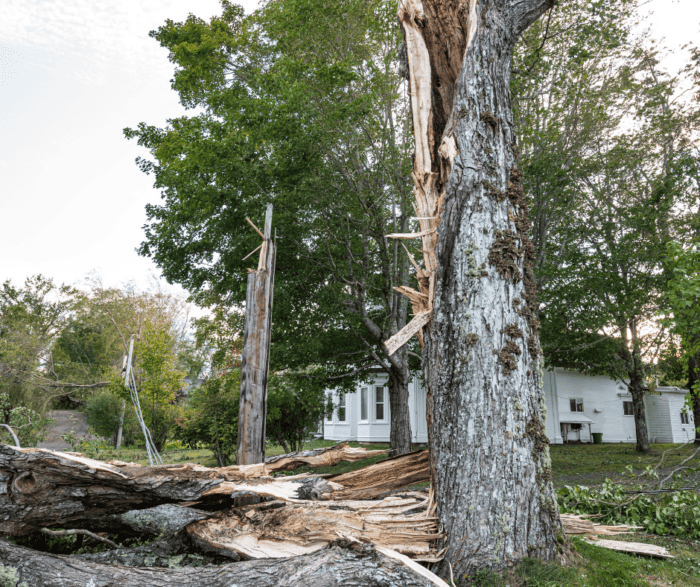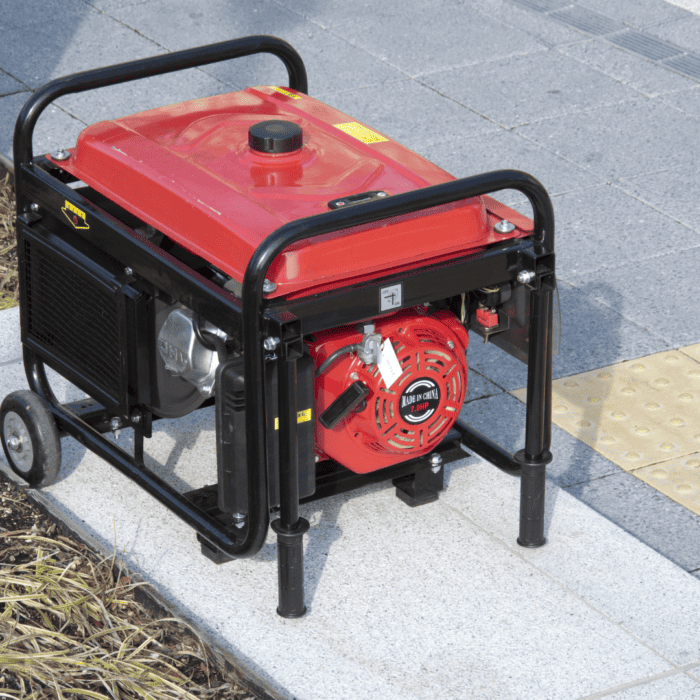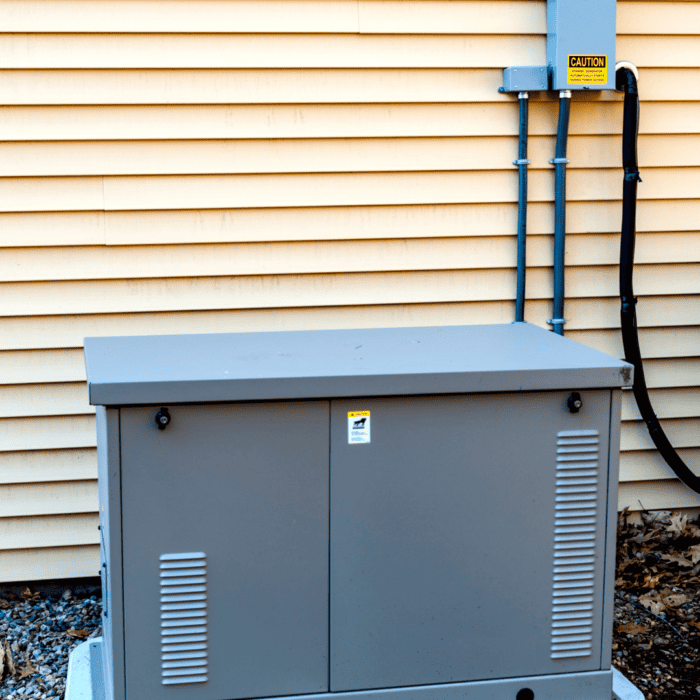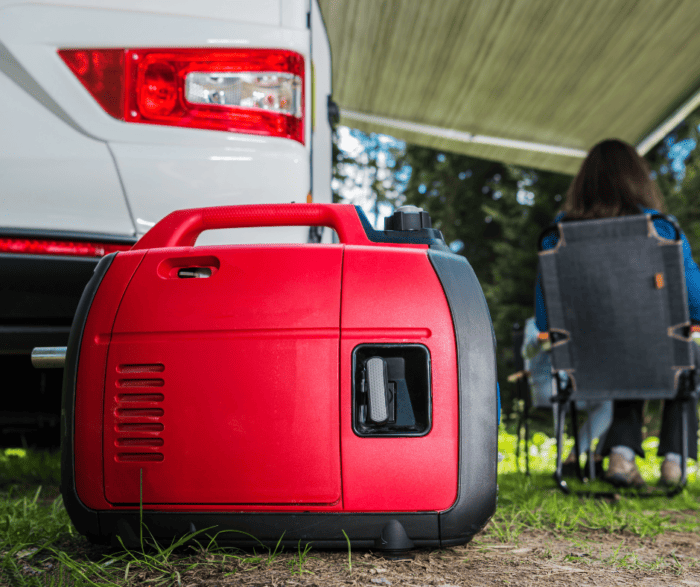When we were choosing where to build our home, we realized that one aspect of living in a remote area and on the grid, is the risk of long-duration power outages. In our area, because of the low population, the chances of the power being out for longer periods is much greater. That makes sense considering that Hydro One would want to concentrate on getting power restored where there is the highest concentration of customers and more critical services.

What is the Risk if the Power Goes Out?
Having the power out for extended periods is a scenario we’ll have to consider more seriously now that we’ll be living here full time. Most of the mechanicals for our home need power, but since we’re installing high-efficiency services, none of them need a lot of it. We have a forced air propane furnace that has an electronic thermostat and blower. Our water comes from our drilled well but it requires a pump, pressure tank and treatment to be potable. There is a sump pump in our crawlspace that needs to function, a freezer and electric appliances in the kitchen as well.
Now, imagine if you will, not having these services available for a number of days in the middle of winter! I’m confident that we could manage in the summer but the idea of a long winter outage with road closures concerns me. Sure, we can do without our fridge and stove for an extended period. We can even go without lights and water filtration for a while (if we keep water reserves). But if we can’t get the water out of our well or if we can’t heat our home, we could be in trouble fast.
How Do We Choose The Best Back-up Power for Us?
Before making the decision to invest in a generator, it’s important to consider all of the factors involved. This includes:
- Evaluating the likelihood of long power outages
- Determining which of our home services are essential
- How much power we will need during an outage
- The types of alternative power supplies available
- The cost of the generator and installation.
We also have to take an honest look at how much lifestyle inconvenience we’re willing to endure. I think the older I get the less I’m willing to sacrifice, especially knowing that such sacrifice isn’t technically necessary these days.
YAY! It’s time to do some more research! Let’s work through the key considerations for choosing a back-up power solution:
What is the likelihood of extended power outages?
Since we’ve been cottaging in the area for awhile and have friends and family living here, we know that the power goes out regularly but not usually for more than a few hours. However, when it’s out beyond a few hours it’s usually out for at least a day.
What is essential to our safety and that of our home?
This will depend on the home and our physical needs. For us, we see the furnace, well pump and sump pump to be most critical. Without these things we could end up having to leave our home to seek warmth and risk frozen pipes and water damage in an extended power outage. We don’t have a wood or propane fireplace for alternative heat in our home so we don’t have easy options for heat.
Next in priority would be our freezer and hot water heater. Our freezer is rated to keep food safe for quite a while as long as we don’t open it. It could be an expensive loss though if the power didn’t come on before things start to thaw. Our hot water heater is propane fired but needs a fan for the exhaust.
Since we’re building this home for the long term and planning to stay in it as long as possible, we may need mechanical medical aids in the future. Those would rank up in the most critical elements too, so we should keep them in mind as well.
What capacity does our emergency power need to service?
Taking each of the priority services above, it’s time to determine the power each would draw. Generators are most commonly rated in kilowatts but to determine if a portable generator is sufficient, we must consider amps as well. Most portables provide 30 amp breaker/outlets and are best suited for lighter loads. A whole house generator will provide a minimum of 60 amps.
Let’s look at our electrical load:
| Service | Amps |
|---|---|
| Well pump | 30 |
| Furnace fan | 10 |
| Sump pump | 30 |
| Coffee maker | 1.5 |
| BASE TOTAL | 71.5 |
From the chart above, you can see that we would need up to 70 amps of power at any given time. This does not factor in the fridge, freezer, oven, lights, etc. Ya, I put the coffee maker in that list just for fun – we can boil water on the barbeque and use instant coffee in a pinch. It’s hard to predict what we might need in the future; we’ll just have to be sure we have enough power for the critical services plus a bit more.
What are our options for electricity for our home in an emergency?



Now that we know how much power we’d need to keep our house safe during an extended power outage, we can easily assess our best options.
The most common solution used in our area is some form of a generator. A generator is a machine that converts mechanical energy into electrical energy. Generators can be portable or fixed and have automatic or manual switches. They can be powered by a variety of sources, such as gasoline, propane, or natural gas. Generators come in a variety of sizes and can be used for powering anything from a coffee maker (because let’s face it coffee is a necessity) to powering your entire home.
Portable Generators are easy to find at most local hardware stores and may not require any professional installation depending on your set-up. They need more attention than whole home generators though. That’s because you have to wheel them up close to the home and manually connect either to extension cords or to your meter base connection for the home. They also require fuel that we’d have to manually keep topped up. That doesn’t sound like much fun for Brian to do in a snow or ice storm! (I’m not going out there!)
Standby (whole home) Generators, on the other hand, are permanently installed outside of your home and connected directly to your existing electrical system. They are more powerful than portable generators and can provide power to your entire home during an outage. However, they require professional installation.
Recently Battery Banks have also become available. Battery banks can be fed by solar, wind, or even by the grid power. Home battery banks work by storing energy generated by solar panels, wind turbines or even from the grid, and then using that stored energy to power the home during times when the main source of hydro is unavailable. The battery bank typically consists of multiple batteries connected in series or parallel to increase the total storage capacity depending on your needs. Battery banks are not common for home use yet and they’re certainly not easy on the budget for the limitations they come with.
NOTE: Whichever option you select for your emergency power supply, your kilowatt hours should be determined by an electrician before purchase.
I suppose the other option, rather than investing in emergency power, is to do nothing. If the power stays out for an extended period of time we could close up the house, and stay with friends or family or go to a hotel that does have power – as long as the roads are open. In that time we’d also be keeping our fingers crossed that pipes don’t freeze, the drainage around our home works as designed, and that things that need to exhaust do so properly. That doesn’t sound like a fun way to spend my time away from home.
What is the cost of an emergency generator or battery bank?
It’s fairly easy to figure out the cost of a portable generator once you decide the size of generator you want, the type of connection you want and whether you’re able to do most of the work yourself or if you need an electrician (if using a meter base switch). For all other options, you’ll need an electrician to provide pricing for the right sized unit for your home.
For the portable generator we had a budget in mind of less than $5,000. For the whole home generator we figured that would be in the area of $10,000. The battery bank option, while attractive/intriguing we couldn’t even imagine, but with it still being an emerging technology we assumed it would be well over $10,000.
What did we choose for emergency power?
For peace of mind, we chose to have a propane powered, stand-by generator installed to power our whole home. We contacted our electrician, had him come out to assess the size of generator we need and provide a quote for installation. His price, including the option of an automatic transfer switch, came in just over our budget. If we consider the cost over the time we’ll be living there, it’s a small price to pay for the peace of mind that we and our home will be safe when we need it most.

Some of our main deciding factors were:
- What if the power goes out when we’re not home for an extended period? We couldn’t make the manual connection.
- It didn’t appear that we could get a portable generator with enough power for our basic needs.
- Road closures are common and can last for days, meaning we may not be able to leave after the power goes out.
We had the meter base installed before the hydro service was connected but the generator won’t be installed until the spring I think. Then we’ll be able to have our site contractor back to trench for the propane and line connections at the same time they do some final drainage work, and place topsoil around the house.
I recognize that we’re extremely fortunate to be able to build our dream home in such a beautiful place. And, I’m grateful to have the resources to even be able to consider having emergency power so we can remain safe in situations when others may not. And, I think I might be getting a little soft (unwilling to rough it) as the years go on.
2 thoughts on “Do We Need a Generator for Our New Home?”
Leave a Reply
Recent Posts
7 Totally Selfish Reasons to Choose Native Plants for Your Gardens
Grab a cup (or glass) of your favorite beverage, and let's delve into what I’ve learned so far about why it's incredibly important and wildly selfish to embrace landscaping with locally native...
Exploring the differences, benefits and drawbacks of Broadcast Sowing and Frost Seeding for Native plants.


Great article Carol. Well written summary. We came to the same conclusion to use a whole home unit. Thanks for all your research.
Thanks Marco. I did have someone comment on one of my FB posts about it that if you have your generator installed by your builder to have it independently tested by your own electrician. They’d likely be the ones helping you troubleshoot in the future (not the builder) so that sounds like a good idea to me.